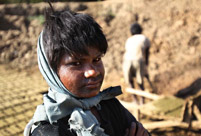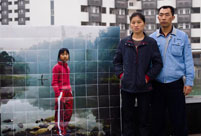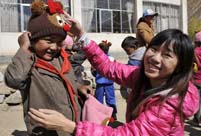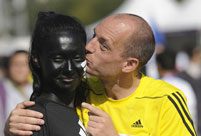BEIJING, Oct. 24 -- In a country where food taboos are as rich as the culinary culture, you may get a well-meaning warning when you ask for fruit after a crab feast.
Crab, according to Chinese folk sayings, will cause diarrhea when eaten with persimmon, and the list of its incompatible partners -- if regional varieties of the legend are counted -- also includes grapes, pears and many other fruits.
Likewise, many other food pairings are described as harmful by the "conflict food" theory, including eggs and soya milk, and honey and Chinese onions. The idea is so popular in China that it appears in cookbooks, talk shows and even the "10 health tips" posted on the walls of some community clinics.
But a group of Chinese science writers is determined to slay the sacred cow of the folk wisdom.
On Guokr.com, a popular science website, the conflict food theory is listed among the most widespread myths concerning daily life, along with "Vitamin C prevents flu" and "Pregnant women should wear radiation protection suits."
"In fact, most of the food pairing taboos are groundless," said Xu Lai, the site's chief editor. "Back in 1935, Chinese scientists conducted experiments to discredit such myths."
One explanation for the crab-and-persimmon myth may be that persimmon contains tannic acid, which can cause stomach ache if digested in excess, while crabs are prone to rotting. However, such health risks remain the same whether eaten together or separately, an article on Guokr explains.
On Guokr, similar "ancient wisdoms" and other pseudoscience are placed under scrutiny by experts and students from all fields of science. With their expertise, the website has debunked famous rumors like "super moon will cause super earthquakes" and "poisoned rats are cooked as pigeon meat."
Analysts say that, as rising social networks in China cause rumors to spread faster and wreak more havoc, closer cooperation is now needed between government and social forces, including scientists and media, to reverse the trend.
In August, Guokr became the first comprehensive science website to join Beijing's anti-rumor website alliance, which is guided by the city's Internet regulators and mainly consists of media and web portals.
Ji Xiaohua, CEO and founder of Guokr, said the website has been an assembly of young scientists and technology buffs who can aid in the battle against the proliferation of rumors that seem astute but contradict scientific common sense.
"Many rumors are now cleverly packaged with new technologies and novel ideas, making it difficult for people without scientific backgrounds to recognize them as rumors," Ji said.
One example is a recent online post, citing a paper published in the Journal of Environmental Sciences, that said tap water in China is polluted by contraceptives due to excessive use of the drugs in aquaculture.
"The pollutants are enduring, unable to be removed by standard water treatment, and can accumulate within human bodies and cause unknown consequences," it said.
The post, written by Dong Liangjie, who claims to be an environmental protection expert, went viral on Sina Weibo, China's version of Twitter.
In response, Guokr contacted the author of the paper, Jiang Weiwei, who then issued a statement via the website accusing Dong of misinterpreting his study and explaining that not all estrogen detected in water is a result of pollution.
"We only detected a very low concentration of such substances in source water, not tap water. The amount is too small to pose any threat to health, and 90 percent of it can be disposed of in water treatment," Jiang said.
FIGHTING FEARS
The most common rumors Guokr deals with are those relating to food safety and public health, which account for nearly half of the more than 1,000 rumors collected by the website.
Though rumors like "papaya enhances breasts" are relatively innocuous, the website has tackled a number of fabricated food scandals that have caused panic and brought losses to relevant industries.
Xu Xiaomao, who grows watermelons in central Anhui Province, is troubled by the yearly recurrence of "injected watermelon" rumors, which accuse farmers of injecting watermelons with chemicals to enhance their sweetness.
"Media have repeatedly debunked the rumors, but they just continue to pop up the next year," Xu said.
Chu Jianxun, a science communication professor at University of Science and Technology of China, said the rampant rumors on China's food safety, pollution and public health reflect the public frustration in these areas.
"When people are angry or anxious, they are more likely to lose judgment and believe in false rumors," Chu said.
China has been hit by a spate of food scandals in recent years, and sociologists say cases like the melamine-tainted baby formula and the use of recycled kitchen oil in restaurants have made the public jittery about food-related issues.
"The government should improve the overall situation of food safety and restore public confidence so rumors will eventually lose followers," said Fan Hesheng, sociology professor at Anhui University.
 Low wages Indian migrant laborers
Low wages Indian migrant laborers Five fighters in flight training
Five fighters in flight training London mayor hails free trade, subway system on China tour
London mayor hails free trade, subway system on China tour Different eye catching shows at housing fairs in China
Different eye catching shows at housing fairs in China Special family portraits call attention to left-behind children
Special family portraits call attention to left-behind children Tibetan girl helps mobilize volunteers onlin
Tibetan girl helps mobilize volunteers onlin Lingerie show dazzles Wuhan Motor Show 2013
Lingerie show dazzles Wuhan Motor Show 2013  Running in fun customs at Beijing Int'l Marathon
Running in fun customs at Beijing Int'l Marathon  Weekly Sports Photos
Weekly Sports Photos Chinese riot police take Liberia peacekeeping mission
Chinese riot police take Liberia peacekeeping mission World has never been dark-- a blind kid’s life in Tibet
World has never been dark-- a blind kid’s life in Tibet Change to law may make it easier to sue polluters
Change to law may make it easier to sue polluters UNESCO world heritage site: Montale Tower
UNESCO world heritage site: Montale Tower U.S. Senate leader announces bipartisan deal
U.S. Senate leader announces bipartisan deal Chinese screen goddesses from Beijing Film Academy
Chinese screen goddesses from Beijing Film Academy Day|Week|Month